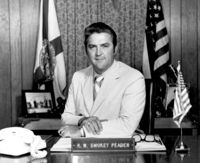Difference between revisions of "R. W. "Smokey" Peaden"
m |
|||
| (One intermediate revision by one other user not shown) | |||
| Line 18: | Line 18: | ||
'''Reubin W. "Smokey" Peaden''' was a law enforcement officer and gospel-singing politician who had served in the [[Pensacola Police Department]] for twelve years before being elected to the Florida House of Representatives (representing [[Florida House of Representatives District 2|District 2]]) in [[1972]] and re-elected in [[1974]]. | '''Reubin W. "Smokey" Peaden''' was a law enforcement officer and gospel-singing politician who had served in the [[Pensacola Police Department]] for twelve years before being elected to the Florida House of Representatives (representing [[Florida House of Representatives District 2|District 2]]) in [[1972]] and re-elected in [[1974]]. | ||
| − | The [[Escambia High School riots]], and the events leading up to them, took place while Peaden was in office, during which he and fellow legislator [[W. D. Childers]] voiced sympathy for white students and parents and offered to explain the "seriousness of the white backlash" to the NAACP.<ref>Gordon Harvey. ''A Question of Justice: New South Governors and Education, 1968-1976''.</ref> | + | The [[Escambia High School riots]], and the events leading up to them, took place while Peaden was in office, during which he and fellow legislator [[W. D. Childers]] voiced sympathy for white students and parents and offered to explain the "seriousness of the white backlash" to the NAACP.<ref>Gordon Harvey. ''A Question of Justice: New South Governors and Education, 1968-1976''.</ref> On [[February 25]], [[1976]], Peaden's home was destroyed by arson.<ref>[http://select.nytimes.com/gst/abstract.html?res=F40915F9345812718DDDAE0894DB405B868BF1D3 "Racial Animosity Turns to Violence in Pensacola, Fla., on Issue of Calling High School Teams 'Rebels.'"] ''New York Times'', March 7, 1976.</ref> |
Peaden was allegedly planning a [[1980]] run for the office of [[Escambia County Sheriff]] when he was brought up on several drug charges. Witnesses claimed Peaden had trafficked cocaine with the intent to use the profits to fund his political campaign. Peaden denied distributing drugs and testified that he approached the State Attorney [[Curtis Golden]] in [[1979]] to provide names of drug dealers. | Peaden was allegedly planning a [[1980]] run for the office of [[Escambia County Sheriff]] when he was brought up on several drug charges. Witnesses claimed Peaden had trafficked cocaine with the intent to use the profits to fund his political campaign. Peaden denied distributing drugs and testified that he approached the State Attorney [[Curtis Golden]] in [[1979]] to provide names of drug dealers. | ||
| Line 32: | Line 32: | ||
[[Category:Florida House Representatives|Peaden, R W Smokey]] | [[Category:Florida House Representatives|Peaden, R W Smokey]] | ||
[[Category:Pensacola police officers|Peaden, R W Smokey]] | [[Category:Pensacola police officers|Peaden, R W Smokey]] | ||
| − | |||
Latest revision as of 12:43, 7 February 2020
| R. W. "Smokey" Peaden | |
|---|---|
| Occupation | Police officer, politician |
| Spouse | Barbara Jean Creel Peaden |
| Children | Debbie Sutton and Gary Peaden |
Reubin W. "Smokey" Peaden was a law enforcement officer and gospel-singing politician who had served in the Pensacola Police Department for twelve years before being elected to the Florida House of Representatives (representing District 2) in 1972 and re-elected in 1974.
The Escambia High School riots, and the events leading up to them, took place while Peaden was in office, during which he and fellow legislator W. D. Childers voiced sympathy for white students and parents and offered to explain the "seriousness of the white backlash" to the NAACP.[1] On February 25, 1976, Peaden's home was destroyed by arson.[2]
Peaden was allegedly planning a 1980 run for the office of Escambia County Sheriff when he was brought up on several drug charges. Witnesses claimed Peaden had trafficked cocaine with the intent to use the profits to fund his political campaign. Peaden denied distributing drugs and testified that he approached the State Attorney Curtis Golden in 1979 to provide names of drug dealers.
He was convicted on five counts on August 18, 1982, which was affirmed on appeal.[3]
References[edit]
- ↑ Gordon Harvey. A Question of Justice: New South Governors and Education, 1968-1976.
- ↑ "Racial Animosity Turns to Violence in Pensacola, Fla., on Issue of Calling High School Teams 'Rebels.'" New York Times, March 7, 1976.
- ↑ Justia.com
